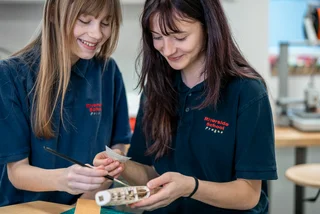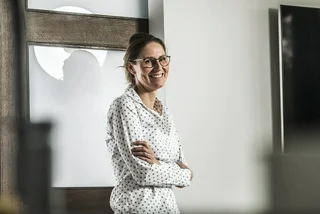Written by Eva Christiansen
for Expats.cz
So you have national health care, either because you are married to a Czech and have permanent residency through your employer. But how do you get started?
PARTNER ARTICLE
As soon as you receive your health insurance card you are eligible for free visits to the doctor. Unlike some countries where you yourself must pay, and later be reimbursed by the state, everything really is free. Doctors´ fees and lab work are free, and prescriptions are mostly covered, though there may be a very small fee for the patient to contribute. But although the care is a great value, the system itself can be daunting.
In general, you may approach any doctor and ask to be their patient. You can ask colleagues at work who they recommend, or simply visit your local medical complex; there is one for each district. Mine is in Prague 5 – right behind Andel shopping center. After 2 years of not visiting a state general practitioner, I stayed out from work due to a very bad cough, and had to produce proof of a doctor´s visit, so I wandered into the large, cold building determined to make contact. To my delight, this was one of the buildings that still operate the stacked, open-booth step-in elevators.
I wandered the hall looking for a door that said “Prakticky Lekar” which means General Practitioner. There were a few, so I chose the door with the name I liked the most “Kveta Tlalaskova ” which means flower, and I liked that she was female. That was it. I then waited with the others, who are all very mindful of who arrived after whom – so the order is maintained and no one gets skipped. I was seen in to the room, the assistant entered my information into a database, and the kind doctor said that of course I could be her patient. My Czech at this point was ok enough to say the basics, and I was very happy to receive a prescription for antibiotics on the spot, which I immediately fill in at the Lekarna in the same building.
Because it takes so long to be seen my a doctor, they are quick here to give you antibiotics before getting results back from a lab – which takes days. But they very much want to follow up, and if you take the pills and don´t return for the second round of testing, you will be reprimanded. I was. It turned out my cough wasn´t cleared up at all by the round of medication – only for a few days only to return – but when I came back two months later with another, non-related complaint and mentioned that I was still coughing, she said that was my own fault for not coming back to get re-tested.
That´s been my experience with a general practitioner. But what if you need treatment from a specialist? Everyone´s experience is different, so I will share my own. When I first arrived, even though I had Czech coverage, I never visited a Czech doctor. The visit to Dr. Tlalaskova didn´t happen until I had already been in Prague two years. I preferred the international clinics. It wasn´t so much because the care was that much better, but when you´re feeling ill, it´s even less fun struggling to find the right words. The consequences of being misunderstood – when it comes to health – are much worse than other language faux-pas, such as ordering the wrong thing in a restaurant or accidentally saying something impolite. So I found myself gladly paying thousands of Kc out of pocket, just for the comfort and convenience.
At one point my “private” doctor made a referral for me to see a Czech specialist who was part of the national system, and that was that. I had to go into the national health care system. Fortunately, I had a name, an address, the precious pieces of paper that got me in the door, and a specific condition that needed specific care. But even so, I felt a little lost. The establishment I visited used the take-a-number system that is used in so many banks and offices. Press the green button if you´re here for “insert unrecognizable Czech word” or the red button if you need “some other thing you´ve never heard of.” As with many things, having a native speaker along can spare you from a nerve wracking experience.
The administrative staff, in my experience, was more grumpy than helpful. The waiting rooms were depressing, and not just the lack of décor or magazines. It´s that they prefer sitting in silence, and don’t chat to pass the time – although -for some reason say do say good bye to the rest of the waiting group when they leave. I found this strange; here we all were, nervously wringing our hands, not looking at each other, and then after it´s done “Goodbye, you all” as though there had actually been some kind of connection. But I guess it´s the detached Czech politeness at work.
In most doctors´ offices, a nurse will periodically bustle out into the waiting room, and you must then rush to hand your paperwork and insurance card to her. She then disappears back into the room, and you are called later. If you don´t do this, you risk sitting there all day. It is very unlikely she will approach you and ask “Are you here to see the doctor? What´s your name? Are you alright?” or anything like that – you have to get in their faces. Czech “general” doctor´s offices do not make appointments – it´s simply first come, first served. At my specialist´s office there was a very loose order: if you had been given an appointment that day, say for “11.00” your name was on a typewritten list on the door of the doctor in question, and these appointments would go in order. But even so, you could easily spend several hours waiting to be seen, including the staff´s one hour lunch break. I suggest taking at least half a day off from work when going to see a Czech doctor.
The first thing I noticed though was that even though my condition was serious, I didn´t feel much concern or interest from the doctors, and I think this is a reflection on the system as well as the people themselves. Doctors are very matter-of-fact, and rather curt. There was no “Where are you from, what do you do,” kind of chit-chat, which is fine, but unlike the American doctors I was used to, there wasn´t the time or patience for a question-and-answer session, and I think that´s a big drawback because when you have a condition, it´s important to know as much about it as possible.
I had a strong feeling my body was like a car at the mechanics shop – and I – the clueless owner. I don´t think it´s just because I was foreign, my doctor spoke excellent English. I t was more that they didn´t want to go into detail about things they thought I couldn´t possibly understand. My speculation of underlying causes was not welcome at all. Their approach was very clinical “This is what´s wrong, eat these pills, see me in three months. Goodbye.” It was first later on the internet that I learned about my condition and how to live with it.
Other things I have noticed: when I went to see male doctors, in general, they were friendlier. Once I had to have an eye examination, and the fellow chatted away and made me feel like a human. The same happened at an x-ray. There were two female doctors in the room, and a male who looked like he was just hanging out and chatting with them. When they asked me to take my shirt off, I motioned to the man sitting there, as if to say “Why does he need to be here as I´m getting naked?” The females were not impressed by this foreigner questioning their way, and seemed miffed. But the fellow just laughed and said it was ok, he was a doctor, and actually he was the only one to even talk to me throughout the procedure, happily using what English he knew to ask what I as doing in Prague and so on.
Americans who are used to a paper sheet covering them during examinations will have to adjust to the idea that the body is nothing to be embarrassed about and the doctor has seen it all. The doctor may ask that you remove your clothing in an unceremonious way, and proceed to poke and prod away. So if you´re very modest, prepare yourself for this. And try not to be uptight about it, it´s just not that big of a deal here.
My own specialist was cold towards me, but she was an excellent doctor and I was thrilled to find someone who spoke English well. When she left I gave her a gift and we had a moment where she opened up about her new study in Canada. I think looking back that medical staff just needs to keep things impersonal, and that´s ok once you know not to take it personally.
What is most significant to me about the system here is that it was a Czech doctor who first noticed that I seemed to have this condition that I have. For years, the employers of my parents, and then me, paid towards coverage in American HMO´s and not one doctor had seen the signs. And unless your condition is severe, many of these for-profit businesses won´t initiate testing, and even if they do, there could be issues with the insurance comma. But the health care system here is not run by privately -owned for-profit agencies, and so even though they may not have the most plush facilities or lots of time to spend with each patient, the overall health of the person is what´s most important.












 Reading time: 8 minutes
Reading time: 8 minutes 



















